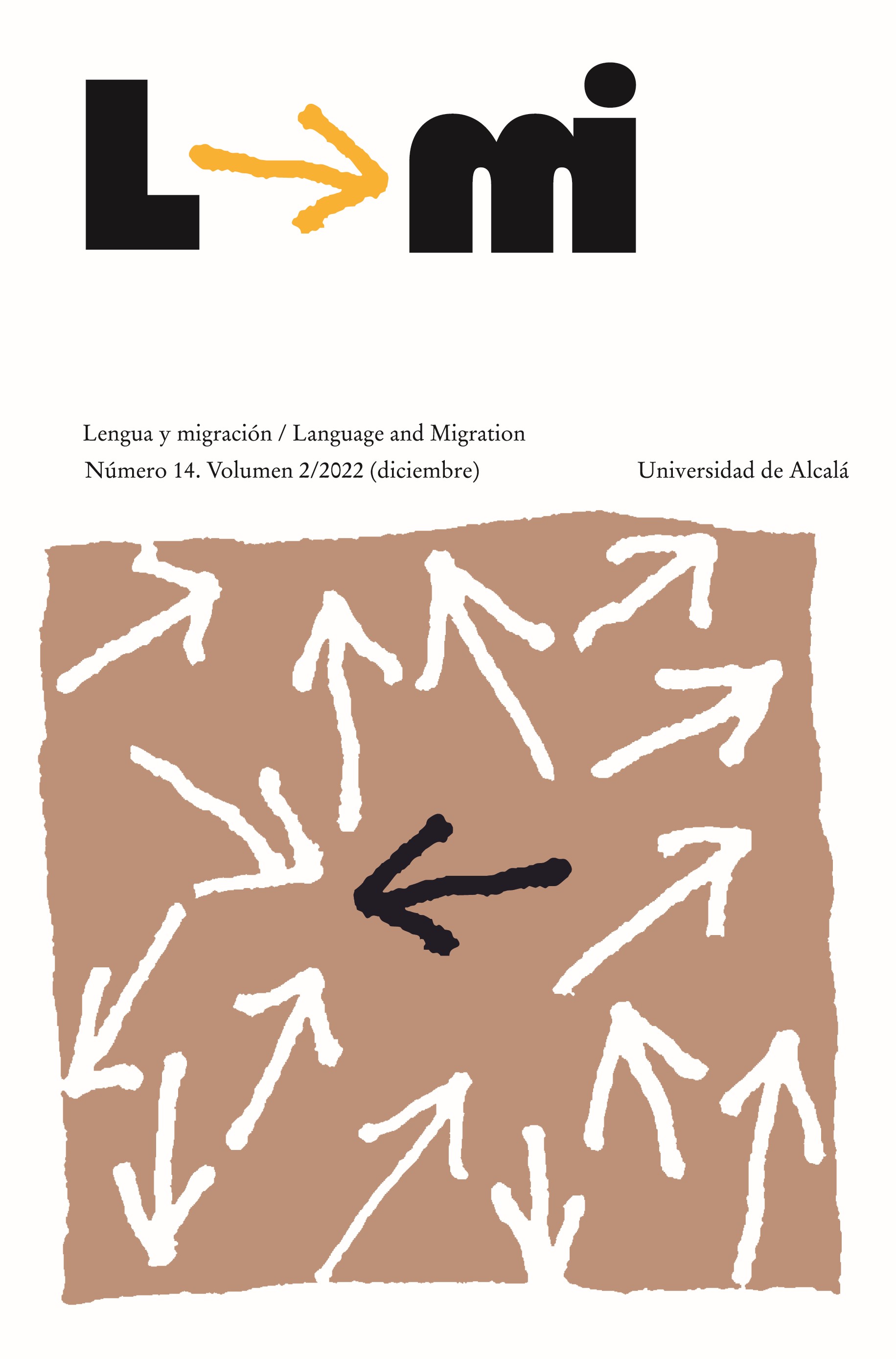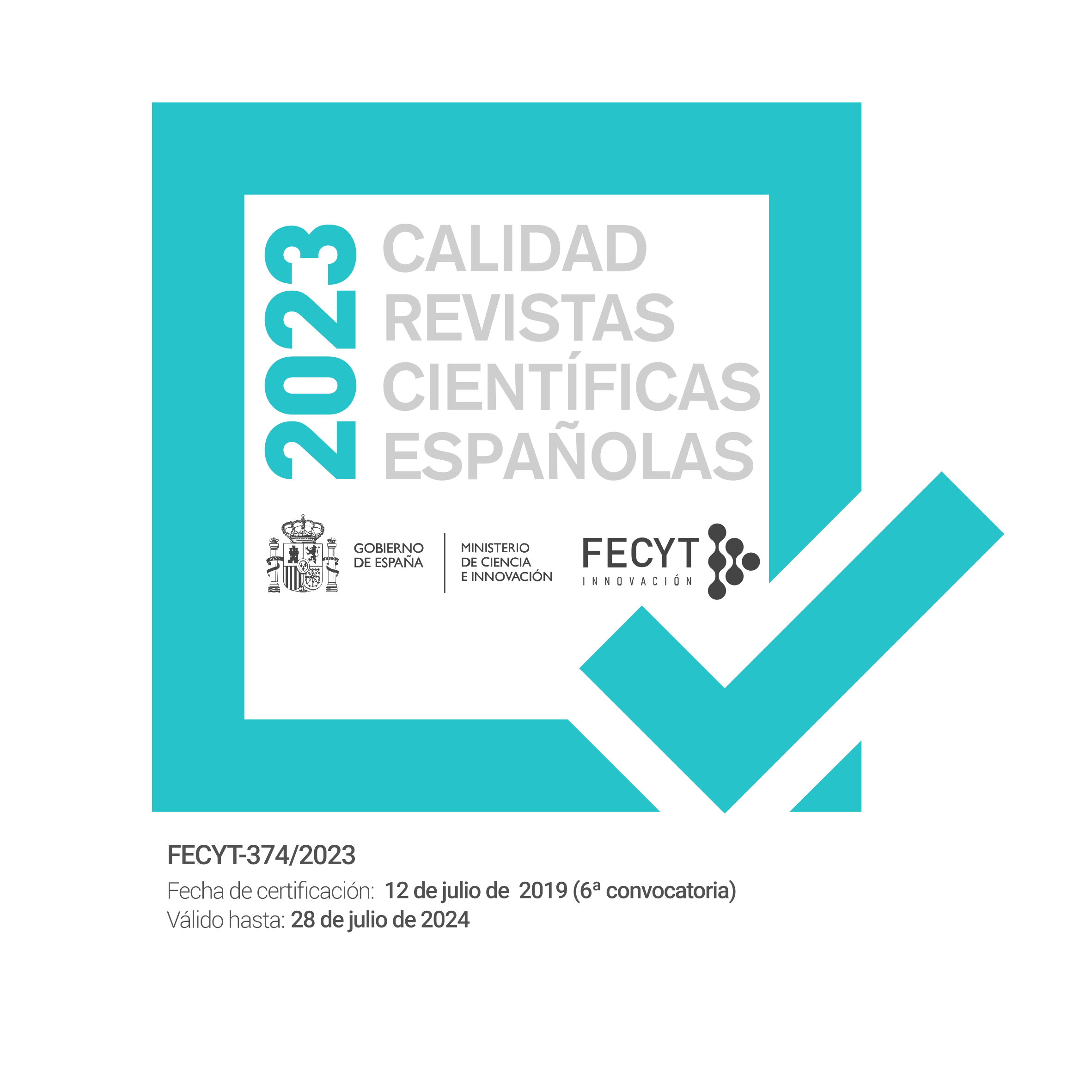La imperiosa necesidad de construir 'muros' para protegernos de los 'invasores'
análisis contrastivo del discurso antiinmigratorio de Donald Trump y Santiago Abascal en Twitter
DOI:
https://doi.org/10.37536/LYM.14.2.2022.1754Palabras clave:
análisis contrastivo, análisis crítico del discurso, discurso antiinmigratorio, Donald Trump y el muro con México, Santiago Abascal y la crisis migratoria en Ceuta, uso político de TwitterResumen
En este artículo, desarrollamos una investigación sobre el discurso antiinmigratorio, realizada en el ámbito del análisis crítico del discurso, en la que analizaremos algunos de los mensajes publicados en Twitter por Donald Trump en 2019 para justificar la construcción de un muro entre los Estados Unidos y México. Dichos tuits serán contrastados con los del líder del partido VOX en España, Santiago Abascal, en los que hace referencia a la situación de crisis migratoria desencadenada en Ceuta durante el mes de mayo de 2021. Nuestra hipótesis inicial es que en dichos textos encontraremos técnicas y estrategias lingüísticas habituales en los discursos antiinmigratorios, como las descritas por Wodak y Meyer (2001), Reisigl y Wodak (2001), Cap (2006), Hart (2015), Wodak (2021) y Demata (2021). Para ello, llevaremos a cabo un análisis contrastivo fundamentalmente cualitativo, que complementaremos con datos procedentes del análisis de corpus. Los resultados apuntan a que ambos políticos se sirven de la descalificación y criminalización de los inmigrantes para apelar al miedo y legitimar sus medidas contra este colectivo.
Descargas
Citas
Arcila, Carlos, David Blanco-Herrero y María Belén Valdez. 2020. “Rejection and Hate Speech in Twitter: Content Analysis of Tweets about Migrants and Refugees in Spanish”. Revista Española de Investigaciones Sociológicas, 172. 21-40.
Baker, Paul y Tony McEnery. 2005. “A Corpus-Based Approach to Discourses of Refugees and Asylum Seekers in UN and Newspaper Texts”. Journal of Language and Politics, 4:2. 197-226.
Baker, Paul, Costas Gabrielatos, Majid Khosravinik, Michal Krzyzanowski, Tony McEnery y Ruth Wodak. 2008. “A useful methodological synergy? Combining critical discourse analysis and corpus linguistics to examine discourses of refugees and asylum seekers in the UK press”. Discourse & Society, 19:3. 273-306.
Baker, Paul, Costas Gabrielatos y Tony McEnery. 2012. “Sketching Muslims: A Corpus Driven Analysis of Representations Around the Word 'Muslim' in the British Press 1998-2009”. Applied Linguistics, 34. 255-278.
Bauman, Zygmunt. 1995. “Making and Unmaking of Strangers”. Thesis Eleven, 43. 1-16.
Baynham, Mike. 2013. “Language and migration”. En The Routledge Handbook of Applied Linguistics, James Simpson (ed.), 413-427. Abingdon: Routledge.
Boza Martínez, Diego. 2020. “'Crimigración' como estrategia electoral: El caso del Brexit”. Revista Española De Investigación Criminológica, 18(2), 1-30.
Brown, Alexander. 2017. “What is hate speech? Part 1: The myth of hate”. Law and Philosophy, 36:4. 419-468.
Cap, Piotr. 2006. Legitimization in political discourse: a cross-disciplinary perspective on the modern US wa rhetoric. Newcastle: Cambridge Scholars Press.
Cap, Piotr. 2008. “Towards the proximization model of the analysis of legitimization in political discourse”. Journal of Pragmatics, 40. 17-41.
Charteris-Black, Jonathan. 2006. “Britain as a container: immigration metaphors in the 2005 election campaign”. Discourse & Society, 17:5. 563-581.
Chilton, Paul. 2004. Analysing Political Discourse. Theory and Practice. London/New York: Routledge.
Cialdini, Robert B. 1984. Influence: The Psychology of Persuasion. New York: Harper Collins.
Council of Europe. 1997. Recommendation R (97) 20 of the Committee of Ministers to Member States on “hate speech” de 30 de octubre de 1997. Publicado en https://rm.coe.int/1680505d5b [fecha de acceso: 06/04/2022].
Costas, Gabrielatos y Paul Baker. 2008. “Fleeing, Sneaking, Flooding: A Corpus Analysis of Discursive Constructions of Refugees and Asylum Seekers in the UK Press, 1996-2005”. Journal of English Linguistics, 36:1. 5-38.
Culpeper, Jonathan. 2011. Impoliteness: Using Language to Cause Offence. Cambridge: C.U.P.
Demata, Massimiliano. 2017. “'A great and beautiful wall'. Donald Trump’s populist discourse on immigration”. Journal of Language Aggression and Conflict, 5:2. 274-294.
Demata, Massimiliano. 2018. “'I think that maybe I wouldn't be here if it wasn't for Twitter'. Donald Trump's Populist Style on Twitter”. Textus: English Studies in Italy, 31:1. 67-90.
Demata, Massimiliano. 2021. “Keeping the Threat Out. Trump’s Discourse, the Wall and the 'Other'”. Altre Modernità, 25. 270-286.
Dick, Hilary Parsons. 2019. “Build the Wall!: Post-Truth on the US-Mexico Border”. American Anthropologist, 121:1. 179-185.
Escoriza, Luis. 2021. “Discourse regarding Catalan declaration of independence”. En Discourse Studies in Public Communication, Eliecer Crespo (ed.), 39-58. Amsterdam/Philadelphia: John Benjamins.
Fernández de Castro, Pedro y Ana González-Páramo (coords.). 2019. La Franquicia Antimigración. Cómo se expande el populismo xenófobo en Europa. Madrid: Fundación porCausa de Investigación, Periodismo y Migraciones.
Fernández García, Francisco. 2017. La descortesía en el debate electoral cara a cara. Sevilla: Universidad de Sevilla.
Festinger, Leon. 1957. A theory of cognitive dissonance. Stanford: Stanford University Press.
Fuentes, Catalina. 2013. “Argumentación, (des)cortesía y género en el discurso parlamentario”. Tonos Digital, 25. 1-26. Publicado en https://digitum.um.es/digitum/handle/10201/38088 [fecha de acceso: 06/04/2022].
Gobierno de España. 24/11/1995. Ley Orgánica 10/1995, de 23 de noviembre, del Código Penal. Boletín Oficial del Estado, 281, 167 (Referencia: BOE-A-1995-25444). Publicado en https://www.boe.es/eli/es/lo/1995/11/23/10/con [fecha de acceso: 06/04/2022].
González, Carmen. 2021. “Análisis léxico y argumentativo del discurso de Santiago Abascal en Twitter: ¿populismo en 280 caracteres?” Tonos Digital, 41. Publicado en http://www.tonosdigital.es/ojs/index.php/tonos/article/view/2830/1257 [fecha de acceso: 06/04/2022].
Hart, Christopher. 2015. Critical Discourse Analysis and Cognitive Science: New Perspectives on Immigration Discourse. Basingstoke: Palgrave Macmillan.
Ismaili, Yassine. 2020. “Trump’s Tweeting Discourse on Immigration- A Critical and Statistical Analysis of Trump’s Twitter Content”. Öt Kontinens, 2017:2. 79-90.
Knoblock, Natalia. 2017. “Xenophobic trumpeters: A corpus-assisted discourse study of Donald Trump's Facebook conversations”. Journal of Language Aggression and Conflict, 5:2. 295-322.
Lee, Jayeon y Weiai Xu. 2018. “The more attacks, the more retweets: Trump’s and Clinton’s agenda setting on Twitter”. Public Relations Review, 44:2. 201-213.
Ling, Dana. 17/05/2018. “Trump on deported immigrants: 'They’re not people. They’re animals'”. Vox.com. Publicado en https://www.vox.com/2018/5/16/17362870/trump-immigrants-animals-ms-13-illegal [fecha de acceso: 06/04/2022].
Mariscal Ríos, Alicia. 2020. “El miedo como estrategia de persuasión y disuasión durante la crisis sanitaria originada por la COVID-19”. En Comunicando en el siglo XXI: nuevas fórmulas, M. Gil, F. J. Godoy y G. Padilla (coords.), 289-301. Valencia: Tirant Lo Blanch.
Martínez, José María. 2005. La psicología de la mentira. Barcelona: Paidós.
McEnery, Tony y Andrew Wilson. 2001, 2ª ed. Corpus Linguistics. Edinburgh: Edinburgh University Press.
Méndez, M.ª del Carmen. 2020. “La construcción de la identidad lingüística de Santiago Abascal en Twitter”. Estudios del Discurso Digital, 3. 50-77.
Mey, Jacob L. 2001, 2ª ed. Pragmatics: An Introduction. Oxford: Blackwell.
Musolff, Andreas. 2012. “Immigrants and Parasites: The History of a Bio-social Metaphor”. En Migrations: Interdisciplinary Perspectives, Michi Messer, Renée Schroeder y Ruth Wodak (eds.), 249-258. Springer: Vienna.
Musolff, Andreas. 2015. “Dehumanizing metaphors in UK immigrant debates in press and online media”. Journal of Language Aggression and Conflict, 3:1. 41-56.
Ott, Brian L. (2017). “The age of Twitter: Donald J. Trump and the politics of debasement”. Critical Studies on Media Communication, 34. 59-68.
Pitropakis, Nikolaos, Kamil Kokot, Dimitra Gkatzia, Robert Ludwiniak, Alexios Mylonas y Miltiadis Kandias. 2020. “Monitoring Users’ Behavior: Anti-Immigration Speech Detection on Twitter”. Machine Learning & Knowledge Extraction, 2. 192-215.
Quealy, Kevin. 19/01/2021. “The Complete List of Trump’s Twitter Insults (2015-2021)”. The New York Times. Publicado en https://www.nytimes.com/interactive/2021/01/19/upshot/trump-complete-insult-list.html [fecha de acceso: 06/04/2022].
Real Academia Española. 2014. Diccionario de la lengua española (versión electrónica). Publicado en: <https://dle.rae.es/> [fecha de acceso: 06/04/2022].
Reisigl, Martin y Ruth Wodak. 2001. Discourse and discrimination: Rhetorics of racism and anti-Semitism. London: Routledge.
Stumpf, Juliet. 2006. “The Crimmigration crisis: immigrants, crime, and sovereign power”. American University Law Review, 56, 367-419.
Trump, Donald. 2011. Time to Get Tough: Making America #1 again. Washington: Regnery.
Van Dijk, Teun A. 1993. Elite Discourse and Racism. California/London /New Delhi: SAGE.
van Dijk, Teun A. 1996. Discourse, Racism and Ideology. La Laguna: RCEI.
van Dijk, Teun A. 2001. “Discourse and Racism”. En The Blackwell Companion to Racial and Ethnic Studies, David Goldberg y John Solomos (eds.), 145-159. Oxford: Blackwell.
van Dijk, Teun A. 2006. Discourse and manipulation. Discourse & Society, 17:3. 359-383.
Vollmer, Bastian A. 2014. Policy Discourses on Irregular Migration in Germany and the United Kingdom (New Perspectives in German Political Studies). New York: Palgrave Macmillan.
Vollmer, Bastian A. 2020. “Categories, practices and the self-reflections on bordering, ordering and othering”. Tijdschrift voor Economische en Sociale Geografie, 112:1. 4-10.
Wodak, Ruth y Michael Meyer (eds.). 2001. Methods of critical discourse analysis. London: Sage.
Wodak, Ruth, Jonathan Culpeper y Elena Semino. 2020. “Shameless normalisation of impoliteness: Berlusconi's and Trump's press conferences”. Discourse & Society, 32:3. 369-393.
Wodak, Ruth. 2021, 2ª ed. The Politics of Fear. The Shameless Normalisation of Far-right Discourse. London: SAGE.
Descargas
Publicado
Cómo citar
Número
Sección
Licencia
Derechos de autor 2022 Alicia Mariscal Ríos

Esta obra está bajo una licencia internacional Creative Commons Atribución 4.0.




